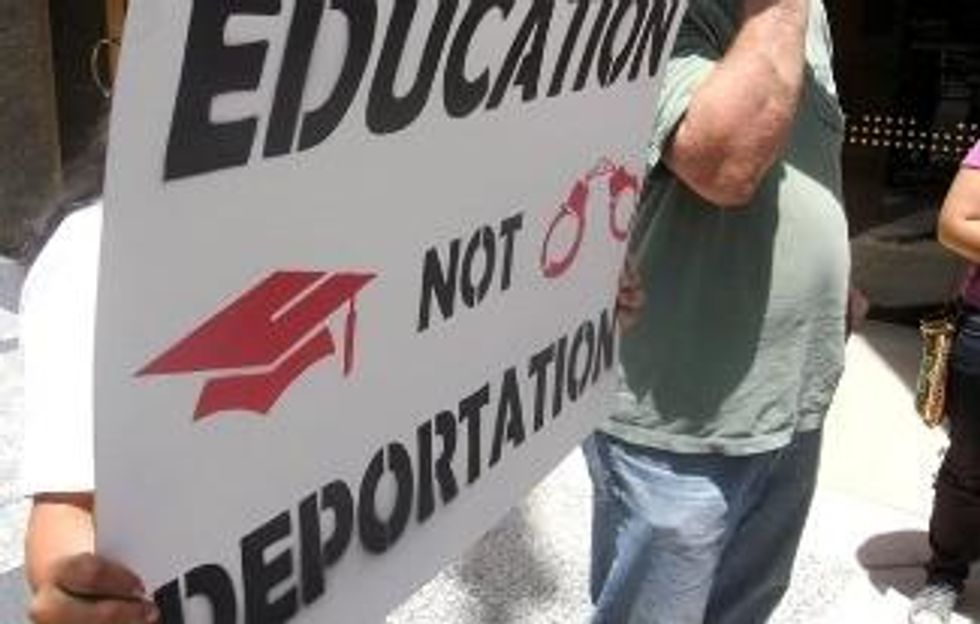Just as immigration is growing as a hot political topic in the South and country, the number of immigrants is in steep decline.
A new study from Princeton's Mexican Migration Project finds that, for the first time in 60 years, net migration has fallen to zero -- and is probably "a little bit negative." That's in line with analysis by groups like the Pew Hispanic Center, which have found that births in U.S.-based families has overtaken immigration as the chief driver in Latino community growth.
In fact, immigration has been tapering off since its 2000 peak; theories for decline include increased prosperity in Mexico, shrinking Latino families and criminal activity along the border.
One factor that likely hasn't had any effect: Get-tough immigration policies, from stepped-up federal deportations to controversial new state-level initiatives, which are too recent to explain the decade-long decline.
That hasn't stopped the push for strict new immigration measures, especially in Southern states which have seen dramatic demographic shifts in recent years. This month, new laws requiring that employers cross-check the eligibility of jobseekers using the troubled E-Verify system go into effect in Alabama, Georgia, Louisiana, South Carolina and Tennessee.
But portions of the laws are now hung up in court after lawsuits from activist groups and, in Alabama's case, a challenge from the Obama administration.
But these legal battles, and the reality that immigration has slowed to a trickle, hasn't stopped politicians from turning it into a hot election-year issue. As GOP presidential hopefuls prepare for the January 21 primary in South Carolina -- a state convulsed by demographic changes -- they've ratcheted up the anti-immigrant rhetoric, as James Rosen of McClatchy-Tribune reports:
Listening to the GOP White House aspirants, you wouldn't know that the number of illegal immigrants in the United States is down, attempted border crossings are at a 40-year low and President Barack Obama has deported undocumented workers at almost twice the rate as his predecessor.
With slight variations, the top candidates back mass deportations, tough state enforcement laws and extending the 675-mile fence along the U.S.-Mexico border, and they oppose giving most illegal immigrants a path to legal residency.
Some Republicans have called for toning down the anti-immigrant rhetoric. Last month, Sen. John McCain told CNN, "The Republican Party has to discuss [immigration] in as humane a way as possible. We have to have empathy, we have to have concern and we have to have a plan."
Meanwhile, Republican front-runner Mitt Romney has pledged to veto the Dream Act, which would provide legal residency to youth who attend college or serve in the military; former U.S. Senator Rick Santorum calls for mass deportations; and former Rep. Newt Gingrich was blasted by his GOP opponents for proposing a path to citizenship for those who have lived in the U.S. for decades.
The hard-line stance may work for mobilizing the GOP base, but it carries a big political risk for Republicans: Alienating Latino voters, especially in states like Florida.
Aggressive anti-immigrant views may give President Obama just the push he needs in among Latinos, who seem to have cooled to the president after his administration's failure to tackle immigration reform and the escalation of deportations under his tenure. According to Pew, deportations have risen to about 400,000 a year since 2009 -- 30 percent higher than the average under George W. Bush's second term. Latinos oppose these policies by a two-to-one margin. (On the flip side, the administration recently eased the granting of waivers to undocumented spouses and children, which could affect up to 100,000 people.)
But perhaps due to the GOP's growing embrace of controversial immigration controls, Latinos still strongly favor Obama over the Republican opposition. Pew's survey of Latino registered voters found Obama won over Romney 68 percent to 23 percent in a hypothetical match-up, and prevailed over Gov. Rick Perry 69 percent to 23 percent.
Overall, 67 percent of Latinos said they identify with or lean towards the Democratic Party; when asked "which party has more concern for Hispanics," 45 percent said the Democrats and 12 percent said Republicans.



